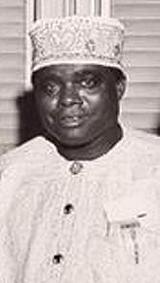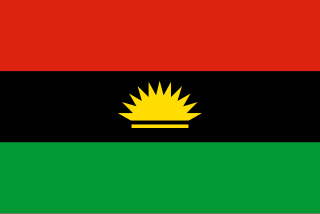
Shehu Usman Aliyu Shagari(listen), titled Turakin Sokoto from 1962, was the first democratically elected President of Nigeria, after the transfer of power by military head of state General Olusegun Obasanjo in 1979 giving rise to the Second Nigerian Republic.

Sir Abubakar Tafawa Balewa was a Nigerian politician who served as the first and only Prime Minister of Nigeria upon independence.
The National Council of Nigeria and the Cameroons (NCNC) later changed to the National Convention of Nigerian Citizens, was a Nigerian nationalist political party from 1944 to 1966, during the period leading up to independence and immediately following independence.

Prince Abyssinia Akweke Nwafor Orizu was a Nigerian of Igbo origin who served as President of the Nigerian Senate from 1963 to 15 January 1966, during the Nigerian First Republic. Orizu was also Acting President of Nigeria from late 1965 until the military coup of January 1966. He was a member of the Nnewi Royal family. His nephew Igwe Kenneth Onyeneke Orizu III is the current Igwe (King) of Nnewi Kingdom. Nwafor Orizu College of Education in Nsugbe, Anambra State, is named after him.
The Lancaster House Conferences in London in 1957 and 1958 were meetings where the federal constitution for an independent Nigeria was prepared. The meetings were presided over by the British Colonial Secretary, and Nigerian delegates were selected to represent each region and to reflect various shades of opinion. The delegation was led by Abubakar Tafawa Balewa of the Northern People's Congress (NPC), and included party leaders Obafemi Awolowo of the Action Group, Nnamdi Azikiwe of the NCNC, Eyo Ita of the NIP and Ahmadu Bello of the NPC – as well as the premiers of the Western, Eastern, and Northern regions. The Chiefs of the Northern Region, Sir Muhammadu Sanusi, Emir of Kano and Alhaji Usman Nagogo, Emir of Katsina' Chiefs of the Western Region, Sir Adesoji Aderemi and Oba Aladesanmi; and Chiefs of the Eastern Region HRH Eze Johnson Osuji Njemanze MBE CON, Paramount Ruler of Owerri, Chief Nyong Essien of Uyo and Chief S. E. Onukogu

Jaja Anucha Ndubuisi Wachuku was a Pan-Africanist and a Nigerian statesman, lawyer, politician, diplomat and humanitarian. He was the first Speaker of the Nigerian House of Representatives; as well as the first Nigerian Ambassador and Permanent Representative to the United Nations. Also, Wachuku was the first Nigerian Minister for Foreign Affairs. A Royal Prince of Ngwaland, "descendant of 20 generations of African chiefs in the Igbo country of Eastern Nigeria".

Chief Samuel Ládòkè Akíntọ́lá(Listen) otherwise known as S.L.A., was a Yoruba politician, aristocrat, orator, and a Yoruba Lawyer. He was one of the founding fathers of modern Nigeria, he served as Oloye Aare Ona Kakanfo XIII of Yorubaland and served as premier of Western Nigeria from independence in 1960 till his assassination in 1966.

Ahmadu Ibrahim Bello(listen), Sardauna of Sokoto, knighted as SirAhmadu Bello, was a conservative Nigerian statesman who masterminded Northern Nigeria through the independence of Nigeria in 1960 and served as its first and only premier from 1954 until his assassination in 1966, in which capacity he dominated national affairs for over a decade.

The First Republic was the republican government of Nigeria between 1963 and 1966 governed by the first republican constitution. The country's government was based on a federal form of the Westminster system. The period between 1 October 1960, when the country gained its independence and 15 January 1966, when the first military coup d’état took place, is also generally referred to as the First Republic. The first Republic of Nigeria was ruled by different leaders representing their regions as premiers in a federation during this period. Leaders include Ahmadu Bello Northern Nigeria 1959–1966, Obafemi Awolowo Western Nigeria 1959–1960, Samuel Akintola Western Nigeria 1960–1966, Michael Okpara Eastern Nigeria 1960–1966, and Dennis Osadebay Mid-Western Nigeria 1964–1966.
Muhammadu Ribadu was a Nigerian politician, who was the first Minister of Defence after independence. The son of a district head from Adamawa's Balala district, he was educated early on at a Koranic school before proceeding to the middle school at Yola.

Raymond Amanze Njoku was a Nigerian politician and former minister for Transport. The son of an Igbo Chief, he was born in Owerri and raised in a Roman Catholic household. He attended Our Lady's School at Emekuku, for primary education. Later on, at St Charles, college, Onitsha, where he was studying, he applied and won a scholarship that earned him an admission into a teachers training school. After brief stints at tutorship in various schools including St Gregory's College, Lagos and St Charles, Onitsha, he decided to change course and study law. After completing his Law studies at Cambridge: LLB Hons Peterhouse College Cambridge, England; he was called to the bar at Inner Temple.

Chief Festus Okotie-Eboh was a Nigerian politician and Minister of Finance during the administration of Sir Abubakar Tafawa Balewa. Okotie-Eboh was born to an Itsekiri Chief, Prince Okotie Eboh in Warri Division, a town along the Benin River in Niger Delta. Before his change of name, he was Chief Festus Samuel Edah. He was a National Treasurer of the Nigerian First Republic party, NCNC, he was also a leader of the Federal Parliamentary Party of NCNC, replacing K.O. Mbadiwe.

Babatunji Olowofoyeku, OFR, SAN, was a Nigerian politician, educationist, lawyer and leader, a Yoruba and native of Ilesha in Osun State of Nigeria, whose political career started in the mid-1950s.

Chief Victor Babaremilekun Adetokunboh Fani-Kayode, Q.C., SAN, CON (1921–1995) was a leading Nigerian politician, aristocrat, nationalist, statesman and lawyer. He was elected deputy premier of the Western Region of Nigeria in 1963 and he played a major role in Nigeria's legal history and politics from the late 1940s until 1995.
Northern People's Congress (NPC) is a political party in Nigeria. Formed in June 1949, the party held considerable influence in the Northern Region from the 1950s until the military coup of 1966. It was formerly a cultural organization known as Jamiyaar Mutanem Arewa.
Muhammadu Inuwa Wada was a parliamentarian and minister of Works and Survey under the administration of Tafawa Balewa. He was a veteran parliamentarian towards the end of the Nigerian first republic and was given the Defense portfolio in 1965 after the death of Muhammadu Ribadu. He was first elected in 1951 as a member of the Northern House of Assembly, he was subsequently nominated to the Federal House of Representatives and was a member and later minister from 1951-1966. Inuwa Wada was known by many as a quiet figure in contrast to the hectic demands of his ministerial portfolio in the Works department which was going through a period of increased focus on major developmental projects as part of a six-year plan during the early 1960s.
Emmanuel Arinze Ifeajuna was a Nigerian army major and high jumper. He was the first Black African to win a gold medal at an international sports event when he won at the 1954 British Empire and Commonwealth Games. His winning mark and personal best of 6 ft 8 in (2.03 m) was a game record and a British Empire record at the time.

The Cabinet of Abubakar Tafawa Balewa was the government of Nigeria, headed by Prime Minister Abubakar Tafawa Balewa, in the years leading up to and following independence. There were three cabinets. The first was established in 1957 when Balewa was appointed Prime Minister by the British Governor-General. The second was formed after the general elections of December 1959, just before independence, in a coalition government. The third was formed after the disputed general elections of December 1964, and was dissolved after the military coup of 15 January 1966.

Igbo nationalism is a range of ethnic nationalist ideologies relating to the Igbo people of southeastern Nigeria. While the term is defined as seeking Igbo self-determination by some, others argue that it refers to the preservation and revival of Igbo culture and, for others, the development of Igboland stemming from the philosophy, Aku luo uno, which means "wealth builds the home".

Sa'adu Zungur was a Nigerian politician and poet who was among early scholars in Northern Nigeria to call for the reform of the society through education during colonial rule.













